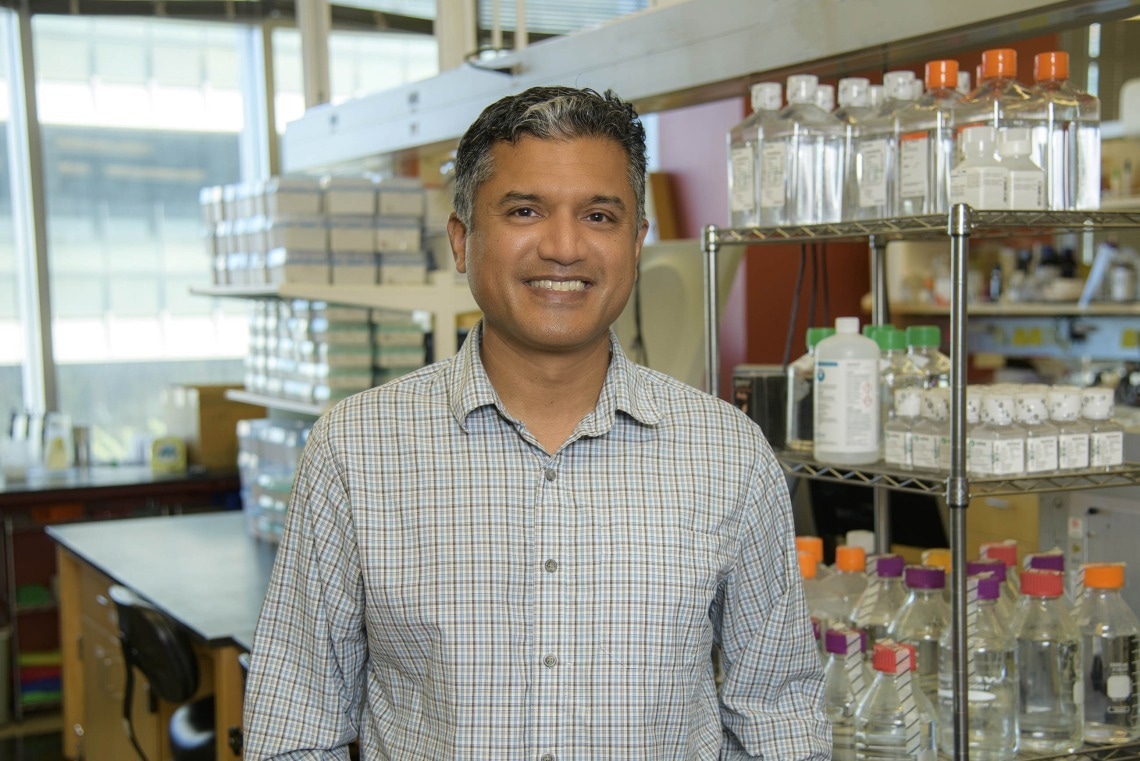According to researchers, genetically modified stem cells may also open the door to novel regenerative medicine therapies for conditions including Type 1 diabetes. After genetically altering pluripotent stem cells to avoid immune recognition, researchers at the University of Arizona Health Sciences have taken a step toward resolving one of the largest obstacles to regenerative medicine: immunological rejection by the recipient.
 Deepta Bhattacharya, Ph.D., who is on the University of Arizona Health Sciences Center for Advanced Molecular and Immunological Therapies advisory council, is a Professor of Immunobiology at the UArizona College of Medicine – Tucson. Image Credit: The University of Arizona.
Deepta Bhattacharya, Ph.D., who is on the University of Arizona Health Sciences Center for Advanced Molecular and Immunological Therapies advisory council, is a Professor of Immunobiology at the UArizona College of Medicine – Tucson. Image Credit: The University of Arizona.
The study was published in Stem Cell Reports. Any form of cell in the body can be differentiated from pluripotent stem cells. The results provide a promising avenue for the future of pluripotent stem cell-based therapeutics, with the goal of rebuilding damaged tissues in conditions including Type 1 diabetes and retinal degeneration.
There has been much excitement for decades around the field of pluripotent stem cells and regenerative medicine. What we have learned from the experiences of organ transplantation is that you have to have matched donors, but the person receiving the transplant often still requires lifelong immune suppression, and that means there is increased susceptibility to infections and cancer. We have been trying to figure out what it is that you need to do to those stem cells to keep them from getting rejected, and it looks like we have a possible solution.”
Deepta Bhattacharya Ph.D., Principal Investigator and Professor, Department of Immunobiology, UArizona College of Medicine
Deepta Bhattacharya and the study team employed CRISPR-Cas9 technology, sometimes known as "genetic scissors," to test their idea. These tools allow scientists to modify the genome precisely in very specific regions.
The researchers identified and eliminated the precise genes they thought were responsible for immunological rejection using human pluripotent stem cells. Previous studies on the relationship between immunological rejection and pluripotent stem cells examined distinct immune system components separately.
Deepta Bhattacharya and his associates from The New York Stem Cell Foundation Research Institute, St. Jude Children’s Research Hospital, and the Washington University School of Medicine decided to test their genetically modified stem cells in a complete and functional immune system.
The immune system is really complicated, and there are all sorts of ways it can recognize and reject things; transplantation across species, across the xenogeneic barrier, is difficult and is a very high bar for transplantation. We decided if we could overcome that barrier, then we could start to have confidence that we can overcome what should be a simpler human-to-human barrier, and that is basically what we did.”
Deepta Bhattacharya Ph.D., Principal Investigator and Professor, Department of Immunobiology, UArizona College of Medicine
Bhattacharya is also a member of the UArizona Cancer Center and the BIO5 Institute and serves on the UArizona Health Sciences Center for Advanced Molecular and Immunological Therapies advisory council.
The researchers altered stem cells into mice with healthy, functional immune systems to test them. The genetically modified pluripotent stem cells were incorporated and continued without being rejected, which was a hopeful outcome.
That has been the holy grail for a while. You might actually have a chance of being able to perform pluripotent stem cell-based transplants without immune suppressing the person who is receiving them. That would be an important advance, both clinically and from the simple standpoint of scale; you would not have to make individualized therapies for every single person – you can start with one pluripotent stem cell type, turn it into the cell type you want, and then give it to almost anyone.”
Deepta Bhattacharya Ph.D, Principal Investigator and Professor, Department of Immunobiology, UArizona College of Medicine
Bhattacharya stated that evaluating the genetically altered pluripotent stem cells in certain disease models is one of the next steps. He is already working with researchers at The New York Stem Cell Foundation and the Juvenile Diabetes Research Foundation to test the technology in animal models for Type 1 diabetes.
Bhattacharya said, “We needed to overcome the immune system first. The next steps are: how do we use these cells? We set the bar pretty high for our study, and the fact that we were successful gives us some confidence that this can really work.”
Bhattacharya is also a co-founder of the Boston-based business Clade Therapeutics, which licensed the technology through Tech Launch Arizona, the commercialization arm of the University of Arizona.
Using immune cells produced from stem cells, Clade Therapeutics is building a strong cellular platform for treating autoimmune disorders and cancer. By the end of the year, the business plans to start clinical studies.
Source:
Journal reference:
Pizzato, H. A., et.al., (2024). Engineering human pluripotent stem cell lines to evade xenogeneic transplantation barriers. Stem Cell Reports. doi.org/10.1016/j.stemcr.2023.12.003